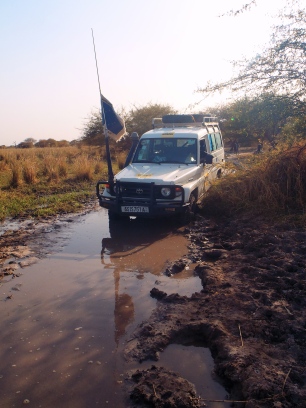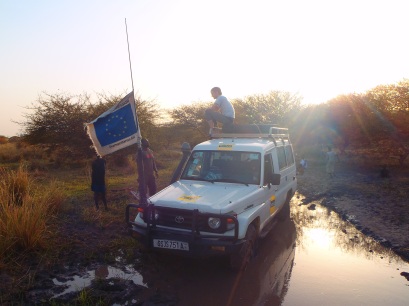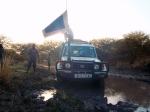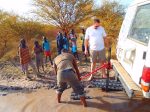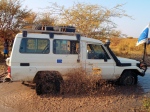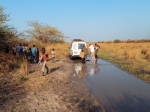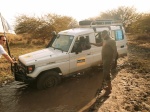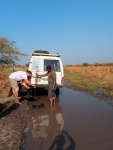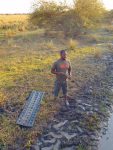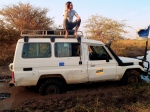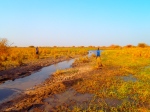We have had visitors in Jonglei. Our Logistics Manager and our roving technical genius were out with us to review the project, and to identify areas where there are room for improvement. There are, it transpires, many such areas, all of which are – unexpectedly – now my purview.
At the start of this year our venerable logistician, who had been with the project for five years – an aeon in humanitarian terms – found himself a new job, and ventured off to pastures new. And, due to the essential combination of proximity and willingness, I now find myself responsible for all of our project logistics.
First among the many challenges facing us is the state of our fleet, for one of the difficulties with operating in an environment such as Jonglei is that it takes a tremendous toll on vehicles, upon which you are reliant for essentially everything. The compound of hostile terrain and unsympathetic driving combine to drastically curtail the lives of our trusty Land Cruisers.
Through a combination of ingenuity, stubbornness and duct tape some of the vehicles are now pushing five years old, and it shows. So, after six months of sitting prone in axle-deep mud we conducted a review of the fleet to determine the functionality or otherwise of the vehicles now that movement is possible once again.
We found that in our fleet of five we had only one fully functional vehicle, a year old three seater pick up – Mobile 4. The first weekend back Mobile 4’s HF radio mast sheared off. As the radio is the only reliable way to contact the base or Juba when in the field, this left us with a grand total of zero fully functioning vehicles.
Leaving the mechanics to their Sisyphean task, Fernandez, Alick and I decided that it would be worthwhile to conduct a driver training exercise wherein we tested both the driver and the vehicles’ ability to drive handle the unforgiving terrain. And so we headed towards the remnants of the river which for much of last year separated us from the project sites.
Where once the river was chest deep and took two hours or more to cross, now the unrelenting equatorial sun had withered it to knee deep and several hundred metres wide. Deciding to see how far we could get we ploughed straight on.
We didn’t very far, of course, but that was the expectation, and at first it was all an awful lot of fun – splashing around in the embarrassingly shallow water offered a welcome relief from the heat of the office. But after an hour or so of utilising the jack and mud plates and alternating between coaxing and brute force it became apparent that we weren’t getting out. The four wheel drive wasn’t working, we didn’t have a winch and all we were succeeding in doing with each attempt was further embedding the wheels in the thick clay, and amusing the onlooking children.
As three of the five vehicles were on the other side of the river at far away project locations and the one remaining vehicle in Yuai was completely non-operational we were stranded. Fortunately, we had another NGO staying in our compound at the time, so we radioed base and waited. As the sun went down there was a burst of AK-47 fire from across the river.
In the end we got back without too much trouble – the oft-repaired towing rope snapped on the first attempt, but we were soon on our way. But it was a reminder of how easy it is for a series of simple oversights to potentially spiral into an altogether more serious situation. Without a torch between us, no backup at base, no spare food or water in the vehicle, broken four wheel drive and a broken winch, we were helpless.
In an emergency, these are the basics upon which you need to be able to depend.
There is work to be done.
……………………
- The All-Important ECHO Flag…
- Jack
- Slip
- Crowd
- Manpower
- Jack #2
- Fernandez
- Perch
- River Entry Point
